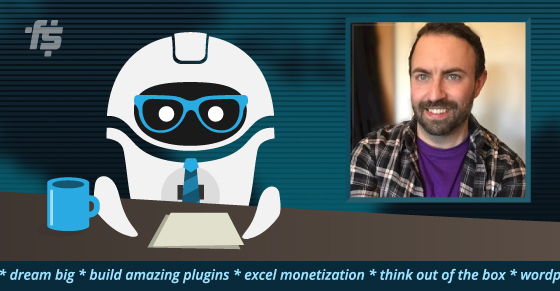|
|
Today, we’re publishing an interview with another great WordPress entrepreneur, Mike Stott, Founder of Epic Plugins, Epic Themes and co-founder of Zero Bullsh*t CRM.
Mike, thanks for agreeing to do this interview! Why don’t we start off by getting to know you a bit – what is your background?
Thanks for interviewing me! My background isn’t computer science or web development, but I did do all the computer programming modules that were on offer as part of my BSc.
Then my MSc was in Applied Numerical Analysis, which was using mathematical programming to “solve” real world problems. This got me hooked.
From my MSc, I went into Actuarial Science while building side projects using WordPress in my spare time. I started selling my “creations” (plug-in features of my side projects) on CodeCanyon back in 2012.
They sold, and I got better at developing for the web and went on to develop 27+ WordPress Plugins, 6+ WordPress Themes and most recently co-develop and co-founded a CRM platform running on WordPress (which has 17+ extensions). These extensions are WordPress Plugins. So I can say I’m pretty experienced now.
What was your first encounter with WordPress and what’s the impression it left on you?
My first encounter with WordPress was when I was using standard HTML files to create a website for consulting services with Microsoft Excel. This was back in 2011.
When I changed something in one of the files (adding a new menu item), I had to go and change this in all my other standard templates. I thought there must be a better way so I went and researched a ‘CMS’ and WordPress was the most popular one.
As for the impression it left, I was doing this back in 2011, so the admin panel and features of WordPress at the time was worse than it is today. It’s moved on a lot since then and with the addition of things like the WP REST API it is making leaps and bounds into being able to be used for almost anything you can imagine.
How did you get into the WordPress business sphere?
It came on the back of a feature request for MYO (a Social eBookstore where authors and readers could connect). One of my eBook authors wanted to release a new book, they had 10 potential cover designs and wanted feedback from the community of authors and readers.
The need was to upload a gallery of book covers and let the rest of the community like, comment and share the images “just like on Facebook”. Social Gallery WordPress Photo Viewer was born.
This was a joint venture at the time with Woody, and we’ve been friends ever since. In 2017 I made an effort to network more within the WordPress community (after quitting my full time 9-5 in December 2016). So far I’ve:-
- Attended the Freemius after party for WordCamp Paris
- Attended my first WordCamp in Edinburgh which I recapped here
I plan to attend more in the future, travel permitting. I’m starting a round-the-world remote year where I’ll be balancing running a business vs being nomadic and seeing the world.
After having met you at the Freemius after party during the last ‘WordCamp Europe’, I know you attend conferences 🙂
Do you enjoy them and do you find them to be beneficial from a commercial point of view?

I’ve not been to enough of them to form a statistical conclusion 🙂 but so far they’ve been great. They’ve opened the opportunity to new relationships. Through attending WordCamps I’ve managed to
- Meet cool people
- Have some beers
- Network with people in the community
- Learn some stuff
- Feel a bit better about my coding skills 🙂 I’m not too bad at this stuff
If you’re in two minds about the benefit of these then check out the review of Zero BS CRM given by Kevin Muldoon. This would have never happened if I didn’t attend a WordCamp (and now I consider Kevin a friend)
You recently wrote a guest post for the Freemius blog about your experience selling premium plugins on CodeCanyon. What advice do you have for a WordPress developer in the commercial plugins space with regards to marketplaces?
Marketplaces can be good if you have the right product. WordPress.org is the biggest marketplace of them all.
You need to be careful that the relationship remains “win-win” and the provider can give you something you couldn’t do easily yourself.
You need to be careful that your relationship with a marketplace remains “win-win” and the provider can give you something you couldn’t do easily yourself.
CodeCanyon used to be a good market for software developers back in 2012 when I first sold products there, but as they get larger they become business focussed and change things, little by little, in their favour.
When the balance is in their favour and they don’t change the commission levels and keep putting more time commitments to the sellers, it’s time to move on. I wrote about this in detail in my post about 10+ reasons why I removed my products from CodeCanyon.
That’s not to say all “marketplaces” are created equal and that they are all bad. Rather than marketplaces, there’s starting to be a rise of SaaS products aimed at WordPress product sellers.
The first one of these I can remember was Sales Genius, a tool for Envato authors where you could (optionally for $19/mo) see sales analytics for your Envato sales. There’s also Freemius, which aims to help product sellers bring a better “free -> paid” option and insights for their products.
Would I re-list my products on a marketplace? Probably not. I like to be in control of the data on my customers and pivot quickly if need be. This isn’t to say all marketplaces are bad and I’d recommend you to take the pros and cons of each one on their own merit.
You made a habit out of publishing monthly transparency reports for your WordPress business. Why do you bother doing that and what kind of reactions have you been getting for them?
The main reason I do them is so I can look back and see how far I’ve come. I’ve grown my businesses to a point where they’re on the cusp of being able to expand a team while still doing what I enjoy doing (building products).

The reactions are a bit of a hit and miss, I’ll often spend a good chunk of time on a transparency report and get hardly any interaction, which is disheartening at times. If this happens I remind myself that first up, the Epic Plugins blog is still growing (and a lower chance of comments than a blog with 100k visits) as well as the fact I’m doing these for me (if others learn from them, then great).
Being transparent has helped in a number of ways though, and opened some opportunities such as:
- Being interviewed for Indie Hackers
- Gives me contacts who are interested
- Helped me recruit to the team
- Gets me links from places like transparent startups
There’s the “worry” that people will sniff at what you do and think “oh, he’s making $5k per month, he’s bragging” but when you break down everything that goes into generating the revenue and how it’s used to further develop products it’s not always a bad thing.
If you’re not doing transparency reports, I encourage you to start. It gives social proof that you’re here to stay.
I’d encourage anyone who doesn’t do this to start, I find it gives a bit of social proof too that you’re not a ship in the night whose website will be gone in the morning (along with your $30).
After testing your new product, ZB CRM, I was very impressed with your onboarding wizard. We are strong believers in the importance of FTUX (First Time User-Experience) and know that many products in the WP sphere fail to deliver a good one.
What was the reasoning behind your onboarding wizard? How hard was the implementation? Have you thought about open-sourcing the onboarding wizard library for other developers in the community

The reasoning was that WordPress plugins, which Zero BS CRM is, install and then just do nothing. You’re left to fend for yourself. Install, activate and end up stuck on the list of plugins page, sometimes none the wiser of where the settings even are.
With a product as feature packed as Zero BS CRM is we wanted to provide a guide during the setup to set some initial options and make the onboarding that bit smoother.
The wizard is an adapted version of WooCommerce tailored to our specific steps for running a CRM, for this reason, we don’t feel the need to have to open source this part of our product.
Finally, the core CRM is open source anyway, anyone can learn from it and adapt it to their own use. I think the whole FTUX goes even deeper than just a welcome wizard. I’ve seen countless plugins use a Welcome Page, a “What’s new in version [x.x]” just like when you update WordPress Core itself.
While this gives some information, it’s still left to the user to set things up unguided and fumble around in the somewhat-dark. At Zero BS CRM we continue to work on this side of things. We look at things like:
- Which pages of our plugin are used the most?
- Which do we think are used a lot (and aren’t actually)?
- Do we have UX help boxes in places where they’re needed?
- What flow do we expect users to take in the plugin?
- Are all pages accessible?
Of course, we don’t get this right first time. This is coupled with support inbox monitoring, if a user “can’t see how to bulk delete contacts imported from CSV” (but the feature is in there) we’ll look at how our signage is and whether we can signpost things better.
From a business perspective, out of all the efforts you have been investing in marketing & promoting your WordPress products – what has provided you with the biggest ROI?
Listening to customers and building what they ask for definitely helps. Tracking user feedback (either on features or “I can’t find [ABC]”) helps us to gradually improve the product as it develops. For products where you’re first starting, this customer feedback is crucial to the long-term success of the product you’re marketing.
Why spend a lot on marketing and give thousands of new users the same frustrations your first 10 users are having? It makes no sense. I call this “in-product” marketing, make it easy for your software users to give you feedback on your product.
Don’t give thousands of new users the same frustrations your first 10 users were having. Listen to user feedback.
Aside from listening to our customers (once we have them), there’s definitely been some good traction from the following sources:
- WordCamps – these have been good to attend and talk to people about the product. We’ve built relationships and written guest posts directly for people who we’ve met at conferences.
- WordPress Blogs – we used Outreach List WP to reach out to blogs prior to our v2.0 launch in April and working with them for content really seemed to help move the needle with Zero BS (something you agree with here) we plan to do more of this for v2.5’s release.
- Celebrity endorsements – Jay-Z loves us, so does Bart Simpson – read more here
I’ve recently started a content marketing strategy with my Epic Plugins and Epic Themes businesses and time will tell how this impacts the overall position of those businesses. ROI from content marketing can be long tail returns when the SEO value sinks in.
Grab a free copy of our Cheat Sheet for
Selling Plugins and Themes
A growth roadmap with concise, actionable tips for every milestone of WordPress product development.

Where do you see your WordPress businesses in 5 years from today, and what are the measures you are taking to make sure success does not fade?
A great question. In my Actuarial Science professional qualification, a lot of studies are around forecasting and models for the future. Rather than writing models for financial institutions about longevity and funding strategy for their pension schemes, I’m able to put this learning into practice for a WordPress product business.
I maintain financial forecasts which help us to analyze how much we can spend on marketing, and when is the right time to hire.
In November 2016, we moved to annual renewals for our products across all businesses. So far we haven’t reached the point where renewals come in, but I’m excited to see how this goes over the next 12 months. Having this in place helps with forecasting and helps us serve our existing customers better in the long run.
Second to this, I’ve started to build a team around the businesses. First up I’ve built the support team for the products up from me to me + 1 (with help from Woody on ZBS CRM). This was a tactical hire for someone who is in a GMT-8 timezone so helps cover the support inbox.
I’ve also recently taken on help in producing content for the Epic Plugins and Epic Themes blogs.
What’s one good tip you can provide for developers who are looking to create a sustainable business around WordPress plugins or themes?
Don’t be discouraged or think you’re “too late to the party”. Spend the time researching your ideas and productize your business. There’s a lot of WP development agencies out there that I’m sure build incredible “plugins” as part of client builds.
More often than not, clients are willing for certain features of their websites to “be released” to the public. It’s often a bit weird to ask them this but generally, my way of doing this is:
- Offering discounted development if the feature can be used elsewhere (not the full site, just a section)
- It helps keep the feature cutting edge
- Other people can benefit from it
It’s not the easiest sell but I do think there are areas where releasing a website feature as a plugin can benefit agencies (and it’s how Social Gallery was born, being offspring of my own personal website development)
It’s not easy though, whether you can just put up 10 plugins on to CodeCanyon and make a living is unlikely (check out the Freemius analysis here) you’ve got to stick to it, market in the right channels and become more than just a “developer”.
Mike, thanks again for providing great & honest answers to my questions! In case someone wants to contact you online for business related inquiries or just to chat, what’s the best place to do that?
I’m happy to chat about anything around growing a business online or discussing any joint venture opportunities. Please don’t contact me trying to sell me services though. 🙂 Connect by following me on twitter @mikemayhem3030 (and drop me a message).








A very fascinating interview that was. I too am a non computer science student who is interested in coding, and designing. This has guided me and given me inspiration to go ahead.
Thanks for sharing the post.